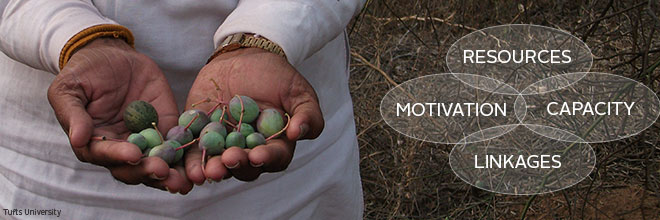
A persistent challenge of development projects is ensuring that the benefits of interventions are sustained after the projects end. However, there is little evidence on the effectiveness of different strategies to ensure the sustainability of development projects’ activities, outcomes, and impacts. The phasing out of development food assistance projects supported by USAID’s Office of Food for Peace (FFP) in Kenya, Honduras, Bolivia, and India provided an opportunity to review the exit strategies and processes that were put into place during the life of the projects and observe their effect on the sustainability of project activities and benefits up to 3 years after the projects ended. FANTA partner, the Friedman School of Nutrition Science and Policy at Tufts University, carried out the FFP-funded multi-year studies, which provide guidance to future FFP projects on how to achieve lasting project benefits, with implications for other development projects as well.
The study focused on the sustainability of activities, outcomes, and impacts in technical sectors including: maternal and child health and nutrition; water and sanitation; agriculture; rural income generation; natural resource management; livestock; microfinance; and education. Findings supported the hypothesis that three factors are critical to sustainability: (1) a sustained source of resources, (2) sustained technical and managerial capacity, and (3) sustained motivation (of beneficiaries and service providers). Linkages to governmental organizations and/or other entities, was considered a fourth factor that is central to sustainability in many circumstances. A gradual process of exit also contributed to sustainability.
The report, Sustaining Development: A Synthesis of Results from a Four-Country Study of Sustainability and Exit Strategies, provides a summary of findings and lessons learned across the four countries studied, as well as recommendations for FFP and organizations that implement FFP projects. In addition, country-specific reports are available for Kenya, Bolivia, Honduras, and India.


